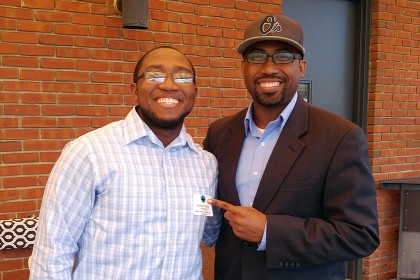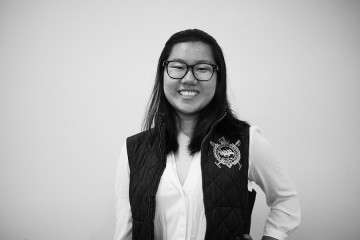The first week of his summer internship was anything but slow.
Awoenam Mauna-Woanya, now a Johns Hopkins University sophomore, began studying the needs assessment for black farmers in Delaware, Maryland, and Virginia on his first day of work with the Black Food Security Network, a Baltimore-based nonprofit.

Image caption: Awoenam Mauna-Woanya (left) and Rev. Heber Brown
On the second day, he traveled to Easton, Maryland, for a mini-conference and sat in on a roundtable discussion with the Northeastern Sustainable Agriculture Working Group during which the attendees tackled real-world problems and ways to solve them.
"This on its own was eye-opening enough to change the course of my week as I learned about the struggles of black farmers," Mauna-Woanya said. "These professionals had the power to make a difference and weren't afraid to grill each other to come up with a solution."
As a Community Impact Intern, Mauna-Woanya spent the summer working to combat food insecurities in communities that are disproportionately hampered by the lack of access to healthy food. In 2015, the Johns Hopkins Bloomberg School of Public Health reported that 34 percent of blacks in Baltimore live in a food desert, compared to only 8 percent of white residents. The Black Food Security Network works to remedy these issues by creating gardens on church-owned land, providing volunteers to maintain those gardens, and establishing pop-up farm stands on days when congregations meet.
Mauna-Woanya worked side-by-side with Rev. Heber Brown, pastor of Baltimore's Pleasant Hope Baptist Church and leader of the Black Food Security Network. The JHU Center for Social Concern, which administers the program, purposefully paired Mauna-Woanya with Brown.
"[He] has a passion to see communities run more efficiently and seeks ways to help bring that about," Brown said. "In a way, I'm chasing a vision to see systemic solutions to social ills that I, too, hope will help communities be both more efficient and more just."
The Community Impact Internship Program, launched in 2011 with the support of an anonymous donor, allows Johns Hopkins students to work with the larger Baltimore community and support the work done by the city's nonprofits, grassroots organizations, and government agencies. CIIP has worked with 325 undergraduates and more than 100 community partners throughout its lifespan.
This year was the first time that the program partnered with Brown and the Black Church Food Security Network.
"One of the most valuable impacts, in my opinion, is for Hopkins students to be able to gain a deeper understanding of the city they call home while they are building valuable relationships with the change-makers in Baltimore," said Abby Neyenhouse, senior assistant director of neighborhood and community programs at the Center for Social Concern.
CIIP matches students to internships that align with their talents and interests. As a civil engineering major and engineering for sustainable development minor, Mauna-Woanya said he was able to learn many practical skills. He contributed to the Black Church Food Security Network's social media efforts, produced videos that highlighted the work and people of various garden sites, and wrote newsletters and articles.
"I am witnessing first-hand the value of social media professionally and how they shape organizations. I can build a small garden. I also understand how various organizations can come together to make events happen," Mauna-Woanya said. "I became more in touch with [Baltimore], and I have a better sense of city and community dynamics."
Posted in Student Life, Community








